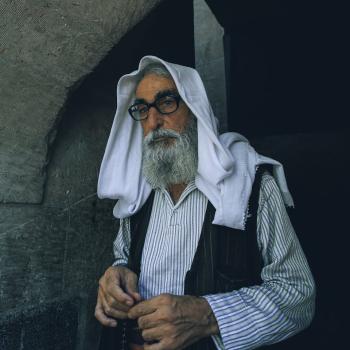The Eucharist is the ultimate participation in something greater than myself, and the fact that it requires participation reminds me that, much as I'd often like to, I can't tread the spiritual path alone. I'm pretty sure that when Jesus said, "I am the way, and the truth, and the life. No one comes to the Father except through me" (John 14: 6), he wasn't saying that if we're not Catholic, we're going to hell. I think maybe he was saying that if we don't come through him, in contact with him—which is the reality of our own broken selves, and our broken brothers and sisters—then we're going to miss the gift. I think maybe he was saying that the flesh-and-blood human encounter, in all its messiness, its awkwardness, its necessary incompleteness, is the way we come to God.
Which is why, instead of attempting to save the entire continent of Africa (as if I'd be qualified, or have the energy to, and assuming Africa even wanted to be "saved"), I have become a firm, firm believer in the act that isn't going to get me anywhere and is inconvenient and involves interacting with another person. For years, I railed against the seemingly constant stream of phone calls and e-mails I seemed to get from people needing help, comfort, or to share a joke: When am I ever going to get any work done? I inwardly keened. When are they going to leave me alone? Then I realized this was my "work" (not to mention what was making me feel needed and therefore probably keeping me alive). And bringing a dessert to a birthday potluck, or attending the graduation-from-kindergarten ceremony of a friend's kid, or driving some narcissistic-personality-disordered complainer who annoys the living crap out of me across town, is often just what's needed when I'm on the verge of calling 911 and begging to be carted off to the psych ward.
I don't mean just for the sake of doing something senseless, or hard, or that I don't want to do, but with a heart open enough to realize, number one, that I'm just as bereft, clueless and personality-disordered as the next guy or gal; and number two, I need to allow my life to touch others, and I need to allow theirs to touch mine. The person I'm giving a ride to will inevitably recite a little poem, or say something weird—"I wonder what the poor people are doing," or "Old Man Time's a son-of-a-bitch" or "My wife called my mother a whore!"—and if all else fails, I'll just ask a bunch of questions and he or she will respond with something funny and human.
Then, when I'm headed home gazing dully out the windshield, or swearing like a stevedore because why does everybody have to drive those tanks nowadays, or feeling sorry for myself because as usual I'm so so ALONE, it's not quite as bad as it usually is. I might be a little bitter, I might be thinking: Oh that's pleasant, that's fair, everybody else gets to have a nice house and a nice husband and have everything go right, all the time, and constant constant love, and I get to give crazy people rides home! Through the smog-spewing, gridlocked L.A. traffic! Thank you, God!
But deep down, something's moved. I'm grateful I'm in good enough shape to be of any kind of help. I've been reminded that everyone—the people driving the tanks, the maddeningly slow-moving clerk at the post office, the poor soul of a homeless guy blocking the sidewalk with his shopping cart—wants the same thing. Everyone wants things to go smoothly, to feel useful, to be accepted; everyone is dying for a crumb of attention, of kindness. My spiritual giant of a friend Maudie was saying one day that when we're focused on what others can give us—adulation, approval—and they don't (which is basically always), then it puts us in a constant state of "disappointment and longing."
Whereas, if we can focus not on what the world can give us but what we can bring to it, things are always set right.
Hers is a message I can never hear enough: that everything we really long for is always right here, right now, because it is always in our power to orient our hearts towards God—towards giving instead of getting. The whole secret of life is not minding what happens—"Behold the handmaid of the Lord; let it be done to me according to Thy word"—and while we're not minding, giving. That's what creates the space in which, invisibly, imperceptibly, while we "slumber" by attending to other people's wounds, our own incurable wounds are healed . . .
My friend Jeff Behrens, a monk at the Monastery of the Holy Spirit in Conyers, Georgia, writes, "Jesus asks that we lay down our lives for each other in friendship, in service, in love. It is not an easy thing to do. It is easy to write about but not easy to live."
He's right: in fact, it's so not easy that without a kind of ongoing consent to the crucifixion of my ego, it would be impossible. I'm not talking about some smarmy "Oh I'm going to go around being nice to everyone" project, which as anyone who's ever tried it knows lasts about five minutes. I'm talking about a whole different way of seeing the world and being in the world: a consenting to be emptied.





